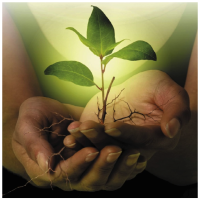“[Earthseed’s] emphasis on change aligns closely with the flexible and spontaneous nature of anarchism …”
Science fiction has always been an important playground of radical politics for anarchists, libertarians, and socialists alike. My personal favorite is Octavia Butler’s Parable of the Sower and Parable of the Talents (the two completed novels of her Earthseed series), which tell the story of a United States of the 2030s in the midst of economic collapse, and fascistic rule, corporate dominance as well as the struggle to build new communities amid this chaos—not to revive the dying empire but to build something new and better from its ashes. As Javier Sethness-Castro writes, “Octavia Butler’s Earthseed series vividly portrays the intersections of racism, patriarchy, and the exploitation of labor in late-capitalist society, while tracing the dialectical struggle between oppression and liberation—the movement from dystopia to utopia.”
This is certainly how the main character, Lauren Olamina, sees it, writing that she is “living in a society that is becoming more and more fragmented, and people are looking for something to believe in, something that will give them hope and direction.” Lauren believes that this hope and direction can be found in her new religion Earthseed, the main tenant of which is: “All that you touch you change. All that you change, changes you. The only lasting truth is change. God is change.” And that God (change), “gives shape to the universe, as the universe shapes God.” Earthseed’s God is all powerful but neither benevolent or malevolent, having no mind to itself but rather being an immutable aspect of reality—perceivable in processes like evolution, chaos theory, and the Second Law of Thermodynamics. God is “trickster, teacher, chaos, clay.”
As parts of this reality, Earthseed—both the religion and the people who make it up—are tasked to “not worship God” or create images of God but to “perceive and attend God” and ultimately “shape God;” and in order to do so they must “shape self.” As such, their prayers are not to a wish-granting deity but rather “[a]ll prayers are to self, and, in one way or another, all prayers are answered. Pray, but beware. Your desires, whether or not you achieve them will determine who you become.” The ultimate goal of Earthseed is to push humanity—and “Earthlife” in general—past its species infancy and toward leaving the planet Earth in order to “take root among the stars.” This is known as “the Destiny.”
The influence of Butler’s ideas and Earthseed in particular have been vast, with the religion leaving behind its fictional origins to inspire real-world efforts such as the transhumanist Terasem Movement, Earthseed Land Collective, EARTHseed Farm, and the informal integration of Earthseed ideas into forms of neo-paganism and religious naturalism. I am of the belief—as a quasi-religious (radical Protestant) anarchist myself—that Earthseed could be of much use to anarchists as well.
For one, the story around which Earthseed emerges is one all too familiar to us in the 21st century; with a declining imperial core, a corporate-ruled economy, and a far-right leader whose slogan is literally “Make America Great Again” (Butler wrote this in 1998). In the face of this, Lauren works hard attempting to develop new communities and networks that can not only cultivate the new religion but help each other and the rest of the world very much on the basis of mutual aid. Dan Fischer cites this as a model for how “if colonial and authoritarian structures are not fully dismantled, then perhaps colonized and oppressed populations can seize more autonomy and land than they can currently access. Tight-knit and diverse communities might survive collapse, as envisioned by Octavia Butler.” And the communities described by Butler—in particular the farmstead Acorn—are far from insular religious cults, but are rather engaged and highly self-aware spiritual assemblies.
‘Worship’ involves equal potential for participation among all members, who may “preach” as they see fit—from The Book of the Living (the main text of Earthseed), other religious texts like the Bible, or just their own thoughts and feelings. They are then opened up to questioning and even dialectical debate by the rest of the congregation—with the only thing like a hierarchy being a critical deference to teachers or “shapers,” a position open to any and all who can garner enough voluntary influence and respect. More specifically than just building these communities, Earthseed spreads in Butler’s books by building schools, training teachers, and helping people get access to education. […]
The internal theology of Earthseed also offers many lessons for and has many parallels to anarchist thought. For one, its emphasis on change aligns closely with the flexible and spontaneous nature of anarchism which not only resists creating exact blueprints for some top-down program but fights for liberation against reactionary and authoritarian forces that must necessarily use violence to enforce the status quo because the nature of reality is change.
These struggles are—as The Book of the Living maintains all struggles are—“essentially power struggles. Who will rule, who will lead, who will define, refine, confine, design, who will dominate.” This understanding of power as being who rules and dominates—to which the anarchists say no one—but also the ability to define, design, and refine emphasizes the sort of positive theories of power emergent in both postmodern anarchism and analyses of classical anarchists in the age of post-modernity. Power is not simply something that operates from a top-down manner but rather permeates all aspects of reality as the way that people and things shape each other. This is essentially what a material analysis—Marxist, Bakunist, or otherwise—is for: to give us a greater understanding of the nonhuman (i.e. natural forces) and extra-human (i.e. economic structures) processes that define our reality and to help us realize that it is through power struggles that the many as opposed to the few are able to consciously shape these material processes. […]
by Locusts & Wild Honey (published at The Anarchist Library on May 20, 2023)

